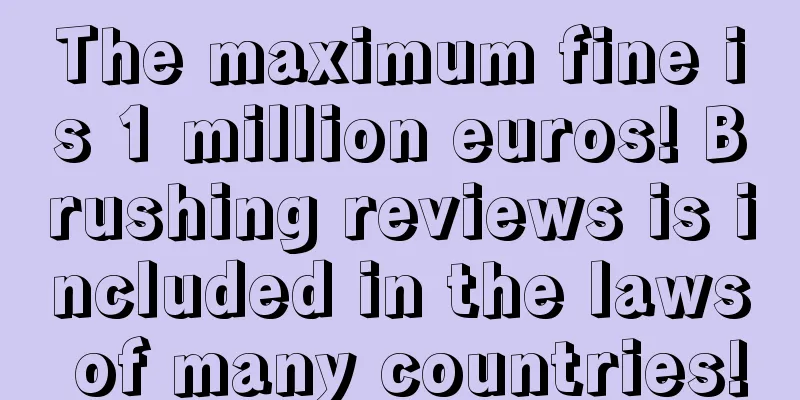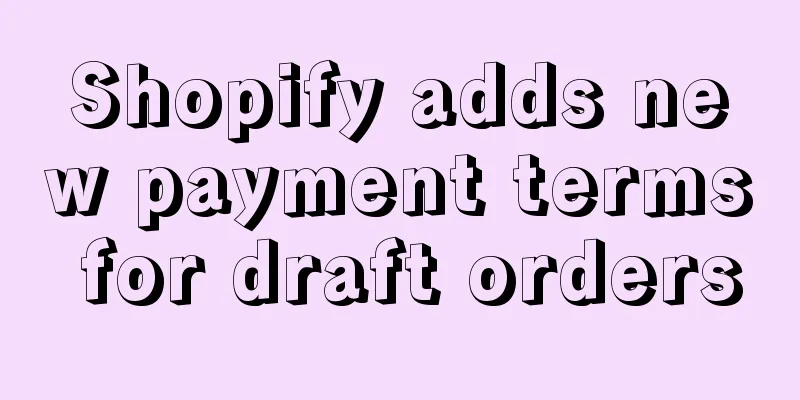The maximum fine is 1 million euros! Brushing reviews is included in the laws of many countries!

|
It is noted that due to the rampant false reviews on e-commerce platforms such as Amazon, many countries have begun to incorporate this behavior into law in an attempt to curb the above-mentioned violations from a legal perspective.
It is learned that the "Fake Reviews Governance Act" approved by Spain in November 2021 has now come into effect. The decree amended the "General Consumer Protection Law" and the "Unfair Competition Law". According to the law, Spanish e-commerce companies are obliged to ensure the rationality and authenticity of reviews of their products and services, and provide clear and detailed information on how these reviews are handled. The unreasonable behaviors stipulated in the Spanish False Reviews Control Act include:
For the above illegal business practices, if they occur only in Spain, the government will impose a fine of up to 1 million euros or 8 times the value of the illegal profits. If the violations occur in multiple member states, the fine will be up to 4% of the company's turnover . In addition, other penalties include confiscation of goods, closure of stores (for up to five years) and other announced sanctions. As early as April this year, foreign media reported that the UK plans to enact new regulations to make paid fake reviews a criminal act. This is intended to protect the public from rogue merchants who "brush up good reviews". In addition, if the platform fails to take responsibility and check whether the reviews are true, it may also be held legally liable.
▲ The picture comes from the official website of the British Parliament If a company violates the new rules, the Competition and Markets Authority will impose financial penalties on it, requiring the business organization to pay up to 10% of its annual turnover or a fine of up to £300,000 in a single case. The fine will be compensated directly to consumers by the regulator. Business Secretary Paul Scully said: “We are making sure that consumer protection keeps pace with our modern, digital society. You will no longer go to a five-star restaurant and get a burnt lasagna.” In today's social networks, media professionals on various self-media platforms are willing to pay for endorsement fees without regard to product quality. Recently, the US Federal Trade Commission (FTC) is considering a new round of revisions to the "Advertising Endorsement Guidelines", which will prohibit advertisers from posting false reviews, controlling negative reviews, and other behaviors that manipulate market opinion.
In addition, the FTC also warned social media platforms that they will bear joint liability if they fail to properly mark which content is paid promotional content. When a self-media celebrity recommends a product, the platform must add prominent labels such as "paid recommendation . "
“We are updating our guidance to combat fake reviews and other forms of misleading marketing, and we will warn marketers about covert advertising directed at children,” Samuel Levine, director of the FTC’s Bureau of Consumer Protection, said in a statement.
▲ The picture comes from the Internet In addition to these typical cases, other government departments in countries such as France and India have also formulated policies this year to target fake reviews in the e-commerce industry. All these phenomena show that illegal operations in the e-commerce industry will inevitably become criminal acts in the future , rather than simply illegal operations.
In the past, fake reviews frequently occurred on many cross-border e-commerce platforms and Internet giants, such as FaceBook and Twitter, where fake order organizations were frequently exposed, and fake reviews and string reviews on Amazon and Wish listings were also mentioned many times. For this reason, major e-commerce platforms began to severely crack down on sellers' fake orders, fake reviews and other illegal behaviors, among which Amazon was the toughest.
In 2021, in the wave of account bans on Amazon against fake orders and reviews, more than 50,000 Chinese merchants were affected. In just two months, at least 3,000 sellers' accounts that had engaged in fake orders and reviews were banned, and many big sellers even suffered losses of billions.
Although the penalties imposed by other platforms are not as severe as those imposed by Amazon, they cannot be ignored. For example, Wish has announced that any attempt to manipulate user reviews or ratings is strictly prohibited, and paid reviews are explicitly prohibited. Once it is discovered that an order has manipulated reviews or ratings, the merchant will be fined up to $10 per order in violation .
As governments around the world have stepped up their efforts to rectify the chaos in the e-commerce industry, laws and regulations on eliminating false reviews have been introduced. In addition to facing the review of the platform, sellers also have to consider whether the relevant government departments will intervene in the investigation. The former may only cost a few stores, while the latter may send the operator to court and face huge fines.
Here, we would like to remind all sellers that the legal provisions on cross-border e-commerce in various countries will become more and more perfect. Sellers caught between platforms and policies need to be more cautious, maintain compliance operations , and stop trying to find shortcuts. |
>>: The seller was fired for opening a private store! Will all operations go solo?
Recommend
CPC full-stage operation mind map
Dear friends, CPC advertising is very important i...
More than 40,000 trademarks are facing invalidation! USPTO's supplementary order sparked heated discussions among sellers
Anonymous user My C position The latest news is th...
What is distribution? Distribution evaluation
A seller is only allowed to list the same product ...
Got bankrupt overnight? A Shenzhen cross-border company ran away due to unpaid rent, and the FBA fees of the European site increased again!
▶ Video account attention cross-border navigation ...
This weekend is not peaceful! A large number of stores have been closed
Another batch of stores died due to brand associat...
Walmart was exposed for selling counterfeit goods! The finger is pointed at Chinese sellers!
<span data-shimo-docs="[[20,"获悉,据外媒报道,近日一名...
What is Trademarkia? Trademarkia Review
Trademarkia is the largest trademark search engine...
Will air freight prices come down? China's first professional cargo airport is put into use!
Click on the blue words to follow us Recently, th...
Shein expands offline presence, launches first Forever 21 "store-in-store"
It is learned that in August this year, Shein anno...
Uncovering the e-commerce marketing strategies and tools used by 6 million-level e-commerce brands
<span data-shimo-docs="[[20,"建立一个百万级电商业务的秘...
What is ClickBank? ClickBank Review
ClickBank was founded in 1998 and is one of the fo...
What is Minter.io? Minter.io Review
Minter.io is a very powerful Instagram analysis to...
Stop selling products with a low average order value of 9.9. Products with a high average order value are the future trend!
Why do we need to make high-priced products? Disad...









